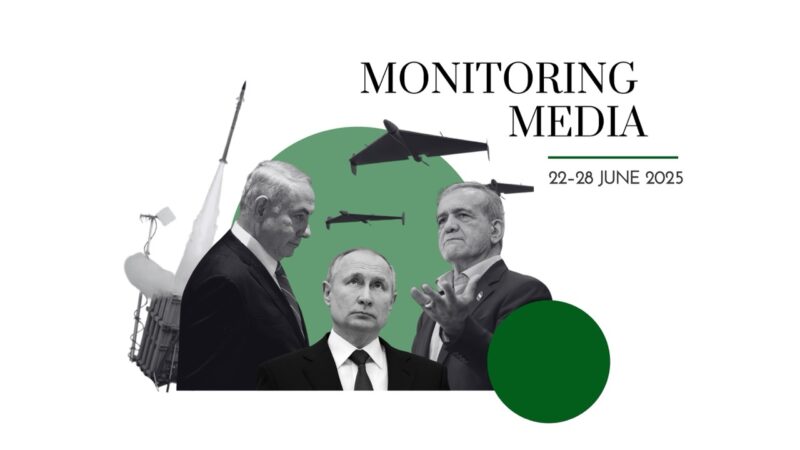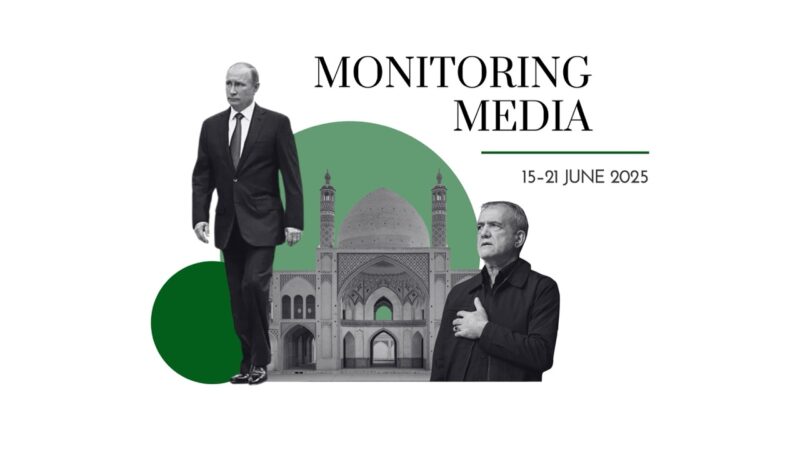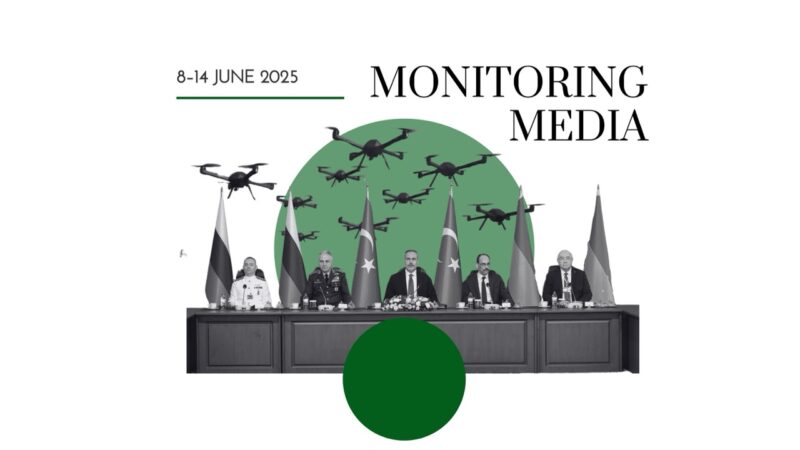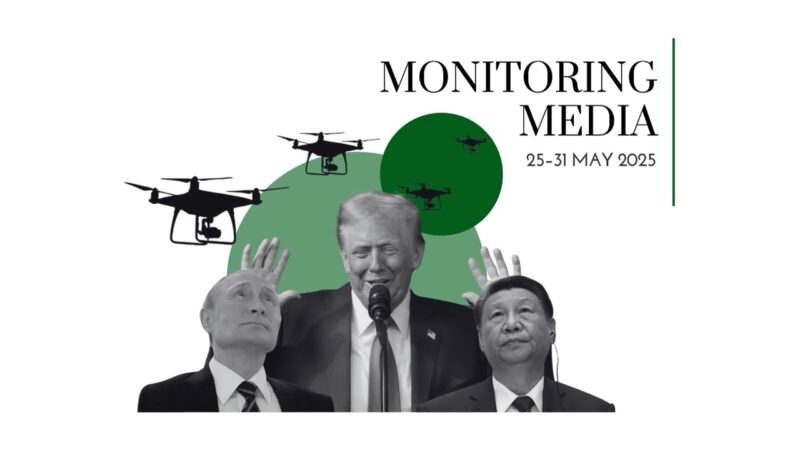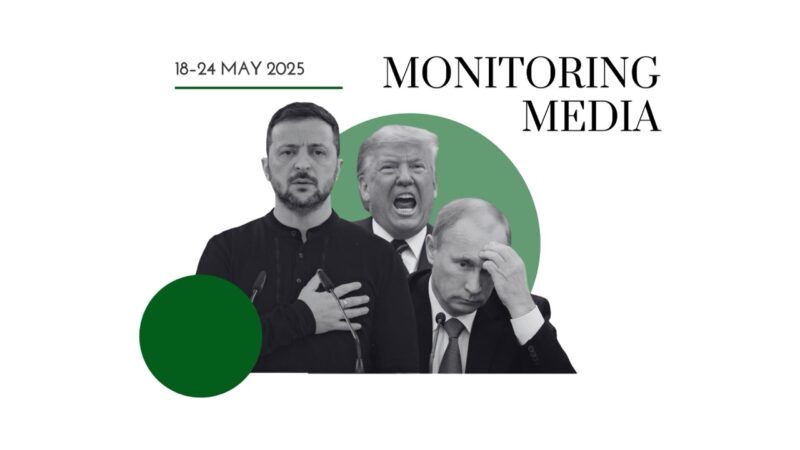Russia’s war against Ukraine is not a stalemate

CIUS weekly report on North American media coverage of Ukrainian affairs, 24 December 2023–6 January 2024
Five publications (Foreign Policy, Foreign Affairs, The National Interest, The Globe and Mail, and Washington Post) were selected to prepare this report on how Ukraine has been portrayed in the North American press during the past week. The sample was compiled based on their impact on public opinion as well as on their professional reputation, popularity among the readership, and topical relevance. These publications represent centrist viewpoints on the political spectrum.
This report covers only the most-read and relevant articles about Ukraine, as ranked by the respective North American publications themselves in the past week. Its scope covers promoted articles on home pages and articles from special sections on Ukraine, with the hashtag #Ukraine, from the paper editions of the publications, and about Ukraine from opinion columns and editorials.
Topics featured in the selected articles:
- The world and Ukraine: Russia’s war against Ukraine is not a stalemate; three key factors that will determine the course of the war in 2024.
- Russia at war: Russia’s war on “woke”; potential successors to Vladimir Putin.
Main arguments:
Russia’s war on woke. Mikhail Zygar (Foreign Affairs) argues that Moscow is using far-right movements in Europe and North America in order to weaken the West. He declares that Russia’s presidential election, to be held in March 2024, will be highly choreographed with a preordained outcome; on the other hand, though, it will allow the world to identify the Kremlin’s plans for the next six years. During the election campaign, President Putin may try to do two things: “One is to play up Russia’s struggle against the West. But the other is something that Westerners will find familiar from domestic politics: decrying socially liberal, or ‘woke,’ policies.” During his election campaign, Putin will talk a lot about traditional family values, condemn transgender people and the LGBT movement “as a foreign campaign to undermine Russian life,” and oppose abortion and migrants. According to Zygar, this is no accident: the Kremlin has adopted the same rhetoric as conservative American media in order to gain support from “populist politicians in Washington and elsewhere.” He has already achieved significant results. Far-right populists in Europe and the United States have welcomed some of President Putin’s remarks. The use of such rhetoric will allow the Kremlin to “undermine Western societies from within”, “tear down the rules-based international order,” and “replace it with a new, conservative global system with the Kremlin at its center.” Such narratives are intended not only for internal but also for external audiences. Despite the total propaganda of traditional values, Zygar notes that Russian society is not conservative: “According to surveys by the Levada Center, for example, only one percent of Russians attend church weekly, and more than 65 percent of Russians say that religion does not play a significant role in their lives. According to other Levada surveys, roughly 65 percent of Russians support the right to abortion.” In the author’s opinion, “For Putin, then, far-right policies and rhetoric are an effective means of building international support. He is, in essence, forming a kind of Far-Right International, similar to the Communist International, which promoted the Soviet revolution in the first half of the twentieth century.”
Who will inherit Putin’s power? Andrew C. Kuchins and Chris Monday (National Interest) suggest that the growing popularity of President Putin’s cousin Anna is indicative of his commitment to dynastic continuity. According to the amended Russian Constitution, Vladimir Putin can run again for the highest office not only in 2024 but also in 2030; nevertheless, it is unlikely that he has not thought about a possible successor. Despite the fact that Putin appears to be in good health—described by CIA Director William Burns in June 2022 as “entirely too healthy”—rumours of his well-being circulate regularly in the media. Therefore, it would be wise for the Kremlin leader and his clan to prepare a potential successor. Rumours in the media and uncertainty about Russia’s war against Ukraine may have prompted him to make this decision. According to Kuchins and Monday, Putin may try to use his own experience from when he was appointed by President Boris Yeltsin in December 1999. The main reason for the approval of his candidacy was Yeltsin’s belief that Putin “would protect the interests of the Yeltsin ‘family’ after his election.” Therefore, it is logical “there is no one better to entrust with protecting his family and their vast interests than a member of his own family.” According to the authors, a likely candidate is Putin’s cousin Anna Tsivilyova, who can do things that other members of Russian elite cannot: “She is forming a wide range of clientelistic bonds throughout all levels of Russian society. By crisscrossing the entire nation to build her veteran centers, she has made sure to showcase her meetings with regional elites.” With the support of Putin’s powerful network, she could expect a fairly easy transition. If the authors are right about Tsivilova’s candidacy, then “the Kremlin seeks to prolong the Putin dynasty for another generation. Putin, as an avid student of Russian history, may find the idea of a hereditary dynasty attractive.”
Russia’s war against Ukraine is definitely not a stalemate. Jack Watling (Foreign Affairs) opines that it is a mistake to assume that the Russo-Ukrainian war has reached a deadlock. The inability of both sides to make significant progress on the battlefield does not in any way indicate a stalemate. This misconception circulated by Western media (and possibly believed by some governments) could lead to Ukraine’s defeat in the war, with serious consequences for the West: “A mobilized and emboldened Russia would pose a sustained threat to NATO, requiring the United States to indefinitely underwrite deterrence in Europe. That would constrain the United States’ capacity to project force in the Indo-Pacific and substantially increase the danger of conflict over Taiwan.” The West is now facing a vital choice: support Ukraine now so that it can prepare for a counteroffensive in 2025, or cede an irrevocable advantage to Russia. The decision of the US and Europe on further support for Ukraine in the next six months will determine the course of further developments: “In one, Ukraine can build up its forces to renew offensive operations and degrade Russian military strength to the degree that Kyiv can enter negotiations with the leverage to impose a lasting peace. In the other, a shortage of supplies and trained personnel will mire Ukraine in an attritional struggle that will leave it exhausted and facing eventual subjugation.” According to the author, Ukraine’s 2023 counteroffensive plan was ambitious and achievable, and the main reason for its failure was the lack of time to train both officers and enlisted personnel: “Over the course of the war, the number of active Ukrainian troops has quintupled, with no significant rise in the number of trained staff officers.” Secondly, Watling believes that in order to prevent the same miscalculations during the next counteroffensive, it is “essential that Kyiv and its partners establish a realistic shared understanding of what materiel and training can be provided, and when.”
Three key factors that will determine the course of the war in 2024. Eugene Chausovsky (Foreign Policy) notes that economic statecraft and targeted diplomacy could play a key role in shaping the Russo-Ukrainian war in the next year. Ukraine’s success in 2024 will largely depend on three primary factors. In security, the key factor in 2024 will not be territorial control, as it was previously, but the ability of states to conduct “operations beyond the front line,” which “will test each side’s ability to endure such a conflict for another year.” Thus, the number of attacks on critical infrastructure is likely to increase. In politics, elections are likely to have a significant impact on the war, with the situation in the United States being quite uncertain. Furthermore, while Presidents Zelensky and Putin may feel confident in their respective domestic political arenas, neither leader “will be immune to domestic political pressures, whether among the hard-line security factions within Russia—displayed most dramatically by the attempted insurrection by late Wagner Group leader Yevgeny Prigozhin—or anti-corruption activists within Ukraine.” Thirdly, according to Chausovsky, economic factors could prove to be the most pivotal in shaping the Russo-Ukrainian war in the coming year. Financial support for Ukraine from the US and EU is critical for Kyiv, while Russia has so far managed to maintain economic resilience and manoeuvre in the face of Western economic pressure “by increasing economic and especially energy ties with countries such as China, India, Turkey, and the Persian Gulf states.” In addition, both countries have focused diplomatic effort on establishing ties with countries of the Global South. However, Kyiv’s priority remains Western support for Ukraine. According to the author, “For 2024, the advantage will ultimately come to whichever side is more adept at economic and diplomatic maneuvering—and the concrete agreements that nation has to show for it.”
Confronting realities in Ukraine. Nina Khrushcheva (Globe and Mail) highlights a miscalculation in the West’s assessment of Russia’s actions in Ukraine, emphasizing that demonization and dismissal have inadvertently strengthened Russia’s resilience. Defying initial expectations of a quick Russian defeat under Western sanctions, Russia has adapted its strategy, sustained its war effort, and maintained domestic support. Khrushcheva underscores the evolving dynamics in the geopolitical landscape, pointing out that while Russia has effectively managed the economic impact of sanctions, Western resolve in supporting Ukraine appears to be waning. The recent failure of EU leaders to pass a substantial financial aid package for Ukraine (including Hungarian and Slovak veto votes) and the reluctance of the US Congress to approve a new military aid package signal potential challenges in sustaining assistance. This diminishing support, coupled with internal strains within Ukraine’s leadership, raises concerns about the country’s resilience in the ongoing war. The author sees three challenges faced by Ukraine’s Western allies: First, renewed Western support for Ukraine must overcome hurdles such as Republican opposition and EU vetoes, compounded by Ukraine’s struggle to recruit soldiers. Second, NATO intervention is being considered, driven by fears of Russian expansion, but it risks intensifying Russian resistance and causing wider instability. Third, the West needs to reassess its approach while thinking about Ukraine’s prospects: “The West should focus on bolstering Ukraine’s defenses while preparing to seize any opportunity to engage in realistic talks with the Kremlin.”
Kyiv needs more Western support amid growing political apathy. Justin Ling (Globe and Mail) argues that several Western politicians, including Vivek Ramaswamy, Pierre Poilievre, and J.D. Vance, are displaying apathy and hindering support for Ukraine’s fight against Russian aggression, arguing that it is largely a war happening in some “faraway foreign lands” (citing Canada’s Poilievre). Ling suggests that these politicians, driven by potential domestic political gains, are contributing to a growing indifference toward Ukraine’s cause, as evidenced in declining support for military aid. He reminds readers of the atrocities faced by Ukrainians under Russian occupation, and of President Volodymyr Zelensky’s response that surrendering territory means giving up on their people. Regardless, necessity and survival have prompted Ukraine to pioneer impressive technological advancements on the battlefield despite all the shortcomings, according to Ling. The country has successfully developed autonomous naval vehicles, mastered intricate tactical manoeuvres using off-the-shelf drones and satellites, and effectively countered a barrage of the world’s most advanced missiles to safeguard its skies. But it still can’t win the war on its own, and Ling calls for continued support for Ukraine by its partners and allies: “No nation has done enough. But at least the levels of support delivered by US President Joe Biden and Prime Minister Justin Trudeau have given Ukraine the ability to make marginal gains while it figures out how to break out of this positional conflict,” Ling writes. “They need to be nudged into doing more, not less.”
How the world can stop the spread of war. David Ignatius (Washington Post) argues that mechanisms to prevent global violence are failing, with UN peacekeeping resolutions frequently being vetoed, deterrence proving ineffective, and the proclaimed “rules-based order” becoming more of a slogan than a reality. Ignatius emphasizes the need for new mechanisms to combat the spread of war and cites former President Dwight D. Eisenhower’s stance that “the only way to win the next world war is to prevent it.” The author criticizes the US for enabling limited wars by wielding its UN veto power, exemplified by instances like Russia’s invasion of Ukraine and Israel’s war in Gaza. He concludes by highlighting the pressing need to build new frameworks to prevent future wars: “We need new rules at the United Nations to stop wars and a new framework for crisis management with allies and adversaries. Otherwise, in 2024 and beyond, we’ll have to think about the unthinkable.”
